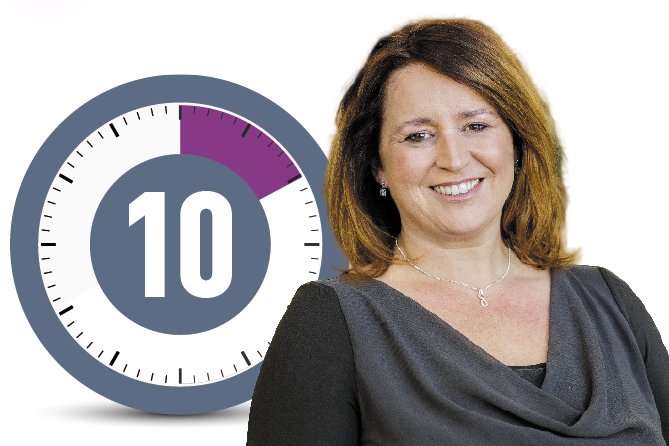AM: What’s your response to the perception that call-handling centres are barriers between customer and service provider, particularly centres located overseas?
Joanna Swash: In the days when companies only wanted to keep costs low, call-handling centres were traditionally dirty words and synonymous with bad service. But not these days.
All our calls are handled by more than 500 employees from our new headquarters in Wrexham. Attempts to have a presence in New Zealand to support the 24/7 service were dropped because visas for UK staff to work there could only be obtained one or two at a time.
We prefer not to be described as a call centre company, but as a telephone answering service and outsourced switchboard provider.
AM: In what other ways do you differentiate yourselves from call centres?
Joanna Swash: By providing dedicated teams for our clients, specifically matching our staff to each client and ensuring they are experts in the area in which they are working. In the case of automotive clients, they also receive training about the brand and the dealership, even to the extent of test-driving a range of models to get a better feel for the product and business.
Typically, at the start of the relationship we will introduce team leader ‘Alice’ in person to a new client and say ‘this is your new switchboard receptionist and first point of contact for your customers who are put through to us’. If Alice happens to be on another call or away from her desk back in Wrexham, then that call will be taken by ‘Kate’ or someone else on the team responsible for meeting the needs of that one client.
The client may wish to remain first port of call for a customer, but if that call goes beyond four or five rings, it is routed to us. We have an overflow role, but the person at the other end is not aware of this. That’s the vital thing, to provide a seamless route of communication. Someone the client knows and trusts to look after calls, exactly as if based in their office.
Being at the forefront of digital technology, we offer far more than telephone-answering alone.
We have recently introduced live chat and integration into dealers’ dealer management systems for services like service bookings. Integration adds an awful lot of value. For example, we can authorise vehicle health checks with our clients’ customers, which improves workshop efficiency and productivity.
We also provide clients with call data reports to help them initiate improvements to their business. No one package suits all brands or dealerships and our smart reporting ensures we tailor our service to their requirements.
Methods of communication are constantly evolving. People these days – particularly the younger generation – are very digitally focused and phone calls are just one part of the channel.
‘Disaster recovery’ is another role. During a trial with BMW Westerly, it had a power cut to five sites that lasted for several hours and all calls seamlessly came through to Moneypenny. We were able to capture calls that would otherwise have resulted in lost sales across both car and aftersales.
Companies don’t get that level of service when they outsource elsewhere.
AM: Where does automotive rank in your client portfolio?
Joanna Swash: It’s one of our fastest-growing sectors out of more than 8,500 UK businesses of all shapes and sizes from sole traders to multinational corporations. The company is projected to grow 20% year-on-year.
Moneypenny has preferred supplier status with Mazda, Mitsubishi and another premium brand (that has asked not be named), but in addition to this we handle the calls for 17 major brands. Our service is recommended to more than 300 retailers and dealerships through the supplier-of-choice status alone. We also work with used car centres and fleet and finance companies.
We currently have a team of 20 brand-trained automotive receptionists, which is projected to be at least 60 by the end of this year, representing a growth from 5% to 17% of the workforce.
AM: Do you have problems recruiting new people?
Joanna Swash: Far from it. Demand always exceeds vacancies, despite the fact that there are major employers like Bank of America only 13 miles away in Chester. People really want to join us – we are among The Sunday Times 100 Best Companies to Work For list – so we can be picky. Many of the applicants come through referrals from family and friends who are already here. Last year, we received more than 4,000 applications for 179 vacancies.
The appeal of working for us was given a significant boost with the opening of our new headquarters (costing £15 million and opened last July, the building is on a 10-acre plot and has features like a tree house meeting area and its own pub). Along with a competitive salary, there are perks like subsidised meals and social events, such as hiring cinemas to show the latest films.
I believe these are just some of the reasons for low staff turnover – just 2%.
AM: What do you look for in an applicant?
Joanna Swash: Attitude above aptitude, although of course the latter is still important in terms of basic skills. Passion is an overused word, perhaps, but that is important, certainly enthusiasm, a ‘can-do’ approach to deliver what the customer expects. Those qualities cannot be faked. Candidates also need to demonstrate a confident telephone manner, lots of common sense, attention to detail – and a sense of humour helps.
Average age is preferably mid-30s because that comes with some life experience. They know what it’s like to have bought a house, bought a car, have gone through the customer experience of being treated well, badly or indifferently. Those shortlisted are first interviewed over the phone followed by interview sessions at our headquarters.
AM: Can you provide, either as a specific case, or in general terms, what benefits your service offers dealerships, such as reduced downtime answering enquiries?
Joanna Swash: During a month-long trial, we discovered that five major brand dealerships would have lost an average £85,000 through lost sales based on the total cost of a new car, service or part that was captured from the calls which were handled by Moneypenny, calls which would have usually gone unanswered.
AM: Are there any impediments to growth and if so, what are the reason(s)?
Joanna Swash: None that I can think of. Our new headquarters will serve us well with our current growth projections and we have 10 acres for further expansion.
The company set up a base in the US two years and that has been well received because no other provider offers our range of services. One auto group has signed us up for outsourcing about 10,000 calls a month.
AM: What lesson have you learned in your management career?
Joanna Swash: To instil in both clients and employees a sense of trust and wellbeing. That’s the ethos of Ed and Rachel (Ed Reeves and Rachel Clacher, the company’s founders). Look after people and the rest will follow. Show what ‘good’ looks like. Also, to keep abreast of innovation so that we are able to offer our clients the very best solutions for their business.
As a business, we learnt early on to recruit from within where possible. It’s a false economy to rush things, to employ people simply to fill a position. Far better to wait for the right person to come along.
Creating the right environment and giving staff opportunities is key to their wellbeing and asking every member of staff for their input on how to improve the business. You’ll always get the best out of people by doing this.
AM: What prompted you to join Moneypenny?
Joanna Swash: I was running my own small company (remanufacturing cartridges for laser printers). It wasn’t going too well so I applied for a vacancy in sales. That was 12 years ago when there were just 20 people. I had a particular empathy with what the company was doing – I totally ‘got it’ – because I knew what could be lost through just one unanswered call.
AM: What do you do for leisure?
Joanna Swash: Cycling, spending time with my children (Alex, 13, and Eleanor, 10) and helping my husband restore an old house we recently moved into.
AM: Are you superstitious?
Joanna Swash: No, but I would not walk under a ladder without first carrying out a risk assessment.
AM: What are your views on the so-called ‘glass ceiling’ for women in industry and commerce? Do women have certain innate skills that men lack, and vice versa?
Joanna Swash: I think times have moved on and success really is down to the individual. I believe that if you are passionate about something, work hard and have a can-do attitude then opportunities will arise. Because of the nature of the job, most of the people we employ are female.
AM: What are your views on executive pay? Should it be capped?
Joanna Swash: Every business is different and has different needs. Of course you have to attract the right person for the job, but each situation is unique.
CHRIS PHILLIPS

















Login to comment
Comments
No comments have been made yet.